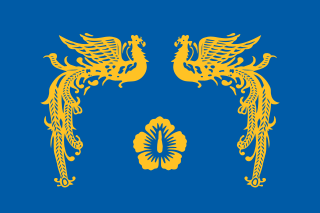This page is based on this
Wikipedia article Text is available under the
CC BY-SA 4.0 license; additional terms may apply.
Images, videos and audio are available under their respective licenses.
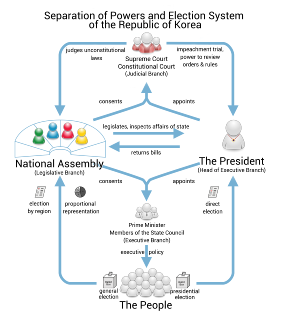
The politics of the Republic of Korea takes place in the framework of a presidential representative democratic republic, whereby the President is the head of state, and of a multi-party system. Executive power is exercised by the government. Legislative power is vested in both the government and the National Assembly. The Judiciary is independent of the executive and the legislature and comprises a Supreme Court, appellate courts and a Constitutional Court. Since 1948, the constitution has undergone five major revisions, each signifying a new republic. The current Sixth Republic began with the last major constitutional revision in 1987.

The Chosun Ilbo is one of the major newspapers in South Korea. With a daily circulation of more than 1,800,000, the Chosun Ilbo has been audited annually since the Audit Bureau of Circulations was established in 1993. Chosun Ilbo and its subsidiary company, Digital Chosun, operates the Chosun.com news website, which also publishes web versions of the newspaper in English, Chinese, and Japanese.
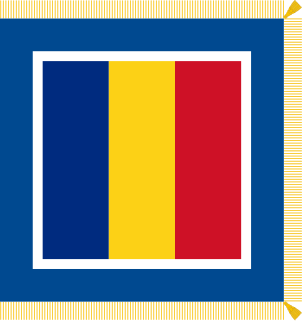
The President of Romania is the head of state of Romania. The President is directly elected by a two-round system for a five-year term. An individual may serve two terms. During his/her term in office, the President may not be a member of any political party.
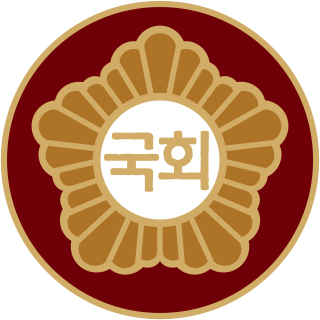
The National Assembly of the Republic of Korea, often shortened to the National Assembly in domestic English-language media, is the 300-member unicameral national legislature of South Korea. Elections to the National Assembly are held every four years. The latest legislative elections were held on 13 April 2016. Single-member constituencies comprise 253 of the assembly's seats, while the remaining 47 are allocated by proportional representation. Members serve four-year terms.

Kim Jong-pil was a South Korean politician and founder of the Korean Central Intelligence Agency, who served as Prime Minister twice, from 1971–1975 during president Park Chung-hee (1961–1979) and from 1998–2000 during president Kim Dae-jung (1998–2002).

Yun Posun was a Korean independence activist and politician, who served as President of South Korea from 1960 to 1962 before being replaced by the long-serving Park Chung-hee as a result of the May 16 coup in 1961.

The Korea Defense Service Medal (KDSM) is a military service medal of the United States Armed Forces that was first created in 2002 when it was signed into law by President George W. Bush. The bill to create the proposal was introduced and championed by Rep. Elton Gallegly (R-CA) and Sen. Jeff Bingaman (D-NM). Several designs for the medal were proposed. The selected design was done by John Sproston.

The Fourth Republic was the government of South Korea between 1972 and 1981, regulated by the Yusin Constitution adopted in October 1972 and confirmed in a referendum on 21 November 1972. From 1972 to 1979, power was monopolized by Park Chung Hee and his Democratic Republican Party under the highly centralized authoritarian "Yusin System". With the assassination of Park on 26 October 1979, the Republic entered a period of tumult and transition under the short-lived nominal presidency of Choi Kyu-hah, controlled under severe escalating martial law and witnessing the coup d'état of December Twelfth, the violent unfolding of the Gwangju Democratization Movement and its armed suppression, the coup d'état of May Seventeenth and presidency of Chun Doo-hwan, and finally the transition to the Fifth Republic under Chun in 1981.
In the United States Army, United States Marine Corps, and United States Air Force, general is a four-star general officer rank, with the pay grade of O-10. General ranks above lieutenant general and below General of the Army or General of the Air Force; the Marine Corps does not have an established grade above general. General is equivalent to the rank of admiral in the other uniformed services. Since the grades of General of the Army and General of the Air Force are reserved for wartime use only, and since the Marine Corps has no five-star equivalent, the grade of general is currently considered to be the highest appointment an officer can achieve in these three services.

Shin Dong-hyun, better known by his stage name MC Mong, is a South Korean hip hop recording artist, composer, radio personality, actor and television personality who is known for his comic disposition and his upbeat songs. He is one of the most commercially successful hip hop artists in Korea. He gained popularity in the early 2000s as an actor on the sitcom, Nonstop, before releasing his debut album, 180 Degree, in 2004. He was also a cast member of the variety show, 2 Days & 1 Night from 2007 to 2010. He was charged in 2010 with draft dodging, after which he was banned from appearing on major Korean broadcast networks. His 2014 comeback album, Miss Me Or Diss Me, topped music charts upon its release.
Chinilpa is a Korean word that denotes Koreans who collaborated with Imperial Japan during its colonial reign over Korea from 1910–1945, or shortly before then, around the time of the Korean Empire. Today, the term is often used derogatorily against Japanophilic Koreans. They are sometimes called national traitors as they supported the colonial government instead of the national government. Their actions included killing independence movement or nation building leaders of the Korean nation, criminalizing the use of Korean language and literature, and taking of resources and property in Korea.
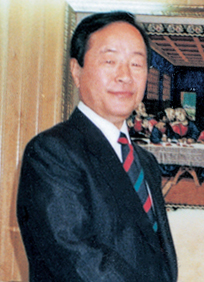
Kim Young-sam was a South Korean politician and democratic activist, who served as President of South Korea from 1993 to 1998. From 1961, he spent almost 30 years as one of the leaders of the South Korean opposition, and one of the most powerful rivals to the authoritarian regimes of Park Chung-hee and Chun Doo-hwan.
The 2016 South Korean political scandal involves the influence of Choi Soon-sil, the daughter of a shaman-esque cult leader Choi Tae-min, over President Park Geun-hye.

Presidential elections in South Korea determine who will serve as the President of South Korea for the next five years.

